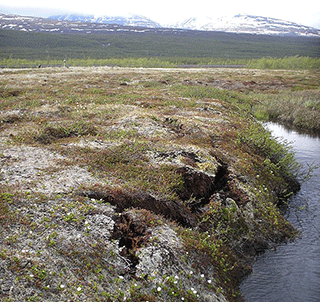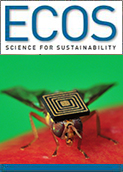
|
Published: 3 March 2014
Melting permafrost reveals deadly secret
A newly identified microbe from the melting Arctic permafrost may be a key to future global warming. The microbe, known as a ‘methanogen’ is the focus of a recent international study reported in Nature Communications, involving Australian scientists.

|
|
Permafrost peatbog borde, Storflaket, Abisko, northern Sweden. Credit: Dentren/Wikimedia Commons
|
University of Queensland researcher, Ben Woodcroft, said the methane-producing microorganism was thriving in northern Sweden’s thawing permafrost in a thick subsurface layer of soil that has previously remained frozen.
Mr Woodcroft said no one knew of the microbe’s existence or how it worked before the research discovery.
He said global warming trends meant vast areas of permafrost would continue to thaw, allowing the microbes to flourish in organic matter and drive methane gas release, which would further fuel global warming.
‘The microorganism generates methane by using carbon dioxide and hydrogen from the bacteria it lives alongside,’ Mr Woodcroft said.
Associate Professor Gene Tyson, another UQ scientist, who was also lead researcher for the study, said the findings were significant.
‘This microorganism is responsible for producing a substantial fraction of methane at this site,’ he said.
‘Methane is a potent greenhouse gas with about 25 times the warming capacity of carbon dioxide.’
The researchers showed the organism and its close relatives live not just in thawing permafrost but in many other methane-producing habitats worldwide.
The team made the discovery by using DNA from soil samples and reconstructing a near-complete genome of the microbe, bypassing traditional methods of cultivating microbes in the lab.
The work was funded by the US Department of Energy Office of Biological and Environmental Research’s Genomic Science Program and the Australian Research Council.
Source: UQ



